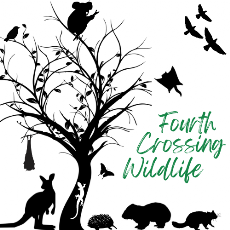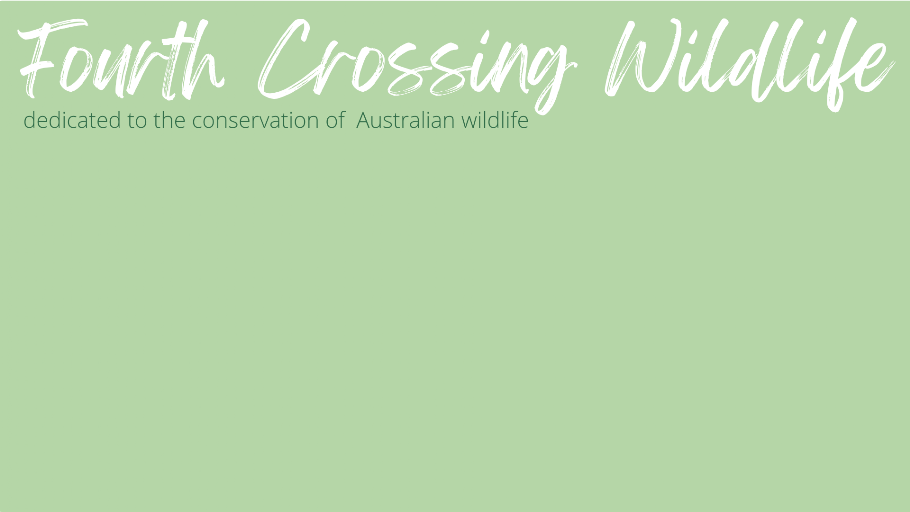Wildlife Resources

Living with Magpies
by Linda Dennis
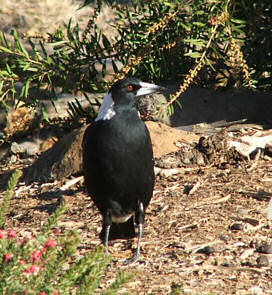 Australian Magpie 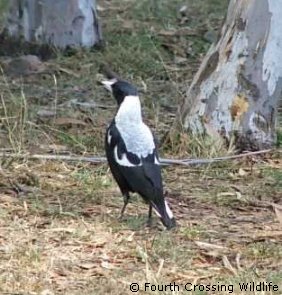 White-backed Magpie of south-eastern Australia 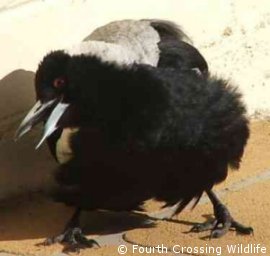 Sunbaking magpie 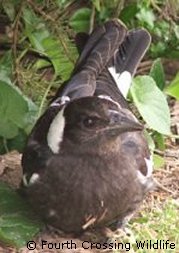 Magpie chick 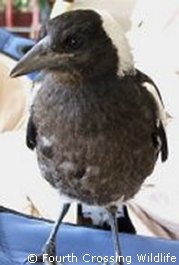 "Mojo", raised and released at Fourth Crossing Wildlife | Ask 10 of your friends if they have had a close encounter with magpies and guaranteed well over half of them will say they have at some point in their lives. The Australian Magpie is considered by many to be quite a rogue, but this lovable Australian icon has received a tough time in the reputation stakes. The magpie is actually a highly intelligent bird and perceived “aggressive” behaviour is solely an act to protect its young. You can learn to live with magpies, and quite successfully in fact. This information explains how you can simply adapt your lives - which is only needed for a very brief period (4 to 6 weeks each year) when magpie’s are in their breeding season. Australian Magpies are wonderful birds with inquisitive, cheeky and larrikin characters. By learning to live with magpies you will be opening your hearts to one of Australia’s most endearing birds. Where are Magpies found? The magpie is one of Australia's best known birds and is quite common throughout the continent. It is found in bushland, farmland, cities and country towns in all states and territories, although there are several sub-species being the Black-Backed, White-Backed, Tasmanian and Western Magpies. When do Magpies Breed? Magpies breed from June to December, although usually only one clutch is raised per year.Between 1 and 6 eggs can be laid which are normally incubated by the female for 20 days. The young are fed by both parents. Young fledge at about 28 days but stay at heel for several weeks, being fed by both parents until it is evicted from the territory or becomes a lesser member of the group. When do Magpies “attack”? For most of the year magpies are not aggressive, but for a brief period of four to six weeks during the nesting season they may defend their territory vigorously. People who enter the magpies territory are seen to be predators or invaders by the birds . Purely to protect their eggs or chicks a magpie tends to swoop low over the intruders head while clacking its beak and sometimes screeching angrily. While these displays can be alarming most are harmless as the bird is just presenting a warning for the person to keep away. Very rarely does a magpie make physical contact with a person, however some birds have been known to strike out with claws and beak. If aggressive displays persist there are ways to reduce the chance of physical injury to the person… or the bird. Ways to adapt your lives so a magpie does not feel threatened. • For the brief period when a magpie may feel threatened try to avoid the area entirely. • Erect a sign that informs others that magpies are breeding in the area and to please keep away. • Wear a hat or place your sunglasses on the back of your head (a magpie normally swoops from behind, if it thinks you are looking at it the bird will probably not swoop). • Similarly, try to keep your eyes on the magpie or try sewing some “eyes” onto the back of a hat or (for the kids!) draw some eyes on the back of an ice cream container. • Carry a leafy branch and wave it around above your head, magpies do not like the swooshing sound and movement. • Carry an open umbrella, the bird will not be able to swoop close to your head. • Don’t ride a bike through the area as magpies see these as even more of a threat than people just walking through. Dismount the bike and walk quickly through the area. • Don’t provoke a magpie - by throwing stones or sticks at it you will only encourage aggressive behaviour. • Become friends with your local magpies. By offering small tidbits of food the magpies in your area will see you as friend and not foe. Don’t offer junk food as you will be doing them more harm than good - try a small amount of lean minced beef, mixed with a small amount of blended dry dog biscuit and Wombaroo Insectavore or Vetafarm InsectaPro (these are insectivorous food substitutes available from most vets) with a little water to make pellets or small balls. Remember to offer treats only, by offering too much they may stop foraging and become dependent on you, and this may encourage a different kind of aggressive behaviour by wanting more food! Magpies and the Law. In most states the Australian Magpie is a protected species. In NSW it is against the law to kill the birds, collect their eggs, or harm their young in any way. If you feel a magpie is a serious menace, it should be reported to the nearest office of the National Parks and Wildlife Service. Magpie Relocation. Magpies should NOT be moved from their natural territory. Magpies are highly territorial birds and those that are captured and relocated will undoubtedly be killed or badly injured by individuals already living in the area. And there are other reasons why relocation does not work. • Eggs and chick will fail to survive - eggs left in the nest will go cold and chicks will die of starvation or exposure. • A new magpie will take the others place and the whole issue will start all over again. • If the dominant male is removed from the territory then the whole flock may become vulnerable and threatened with displacement. Magpies from neighbouring territories may invade the area and remaining magpies may be attacked and killed or injured. The last word…. Magpies are really quite lovable and it is easy to learn to live with these wonderful birds. A magpie friend is a good friend to have, particularly in the garden where it will eat up all your grubs! And the magpie song is a sound to enjoy - what a wonderful way to start your morning! Click to download Australian Magpie Fact Sheet - PDF file 828kb |
